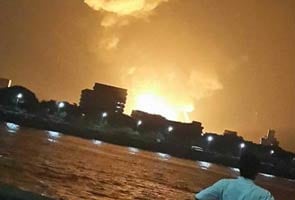
One of Indian Navy's most advanced non-nuclear submarines, INS Sindhurakshak, exploded and sank on Wednesday in Mumbai. Three officers and 15 sailors on board are feared dead in what is being described as Navy's worst disaster in over three decades. Navy chief Admiral DK Joshi admitted that safety mechanisms did not work on the fully-armed submarine, which is now resting its nose on the seabed eight metres down. The investigation into what triggered the explosions could take four weeks.
Here are the latest updates
INS Sindhurakshak exploded and caught fire after midnight on Wednesday, hours before its operational deployment. There were three explosions, which led to a fire.
"Quite obviously the safety mechanisms have not functioned," admitted the Navy Chief. The 16-year-old submarine was reportedly carrying heavyweight torpedoes and "Klub" anti-shipping and land attack missiles.
Grainy amateur video footage taken by a witness showed a fireball in the forward section of the Russian-made vessel, the place for weapons and battery units.
Today's disaster will have a big impact on the underwater combat capabilities of the Indian navy, which has an already depleted strength of 14 submarines though it needs 30.
The Sindhurakshak was handed over to India earlier this year after nearly two years of overhaul and refitting in Russia at the cost of 80 million dollars or 480 crore rupees. It was expected to serve the navy for at least 10 more years.
The vessel had been sent to Russia for a mid-life upgrade in 2010, months after a fire on board while it was docked in Visakhapatnam, Andhra Pradesh. A 24-year-old sailor was killed in the fire.
A spokesman for the Russian company which overhauled the vessel said that India raised no objections when it was returned after testing in April. The submarine is still covered by a Russian warranty.
INS Sindhurakshak was built in 1997 at Saint Petersburg, for anti-submarine and anti-ship warfare, defending naval bases, securing coasts and sea lanes of communication, reconnaissance and maritime patrol operations.
The accident is set to overshadow scheduled talks between Indian Prime Minister Manmohan Singh and Russian President Vladimir Putin at a G20 summit in St. Petersburg in September.
Russia is still the biggest military supplier to India, but relations have been strained recently by major delays and cost over-runs with a refurbished aircraft carrier, the INS Vikramaditya.

